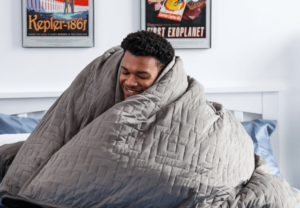Modern life is stressful. A tough day at work is perfectly normal, as is going through a bereavement, or being up all night with a baby. But prolonged exposure to stress can affect your mental and physical state.
The thing about stress is it often triggers emotional changes, making you feel anxious, frustrated, and angry. These can then lead on to behavioural changes, such as becoming withdrawn, indecisive, and irritable.

This can impact your personal and professional life, having a negative effect on your relationship with friends, family, and your ability to earn a living.
Stress has also been shown to play a major role in the development of obesity, and it can be a precursor to self-harm.
When left to fester, stress is also known to develop into anxiety and depression, two conditions which can be very hard to treat and break. Stress and anxiety are directly linked, as are stress and depression by numerous studies.
People who experience stress over a prolonged period are highly likely to develop symptoms of anxiety and depression. The science behind this is hormonal, with stress elevating levels of cortisol (the stress hormone), and reducing the production of dopamine and serotonin (the “feel good” neurotransmitters).
These hormones can also affect sleep quality in devastating ways.
Poor sleep
One of the most common side effects of anxiety, depression, and stress in general is poor sleep quality. People who are stressed will often find it more difficult to fall asleep, and when they do finally nod off, their quality of sleep tends to be lower than normal; they are easily woken and find it difficult to drift off again.
Sound familiar?
You’re not alone!
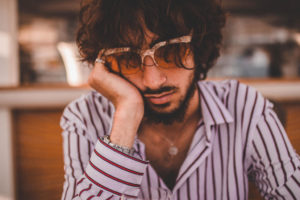
In 2011, the Mental Health Foundation conducted a survey of 6,800 people in the United Kingdom, and found only 38% of them were “good sleepers”, with 36% of them classified as having possible chronic insomnia.
Even worse, a staggering 79% of people with insomnia said they had had it for at least two years — proof that many people are not getting the help they need!
The Importance of a good night’s sleep
Getting a good night’s sleep is important to look and feel your best.
With good sleep, we feel rejuvenated and alert. Sleep is necessary for our body to heal, recover, and remember what we learn. Without sleep, our body slowly shuts down, which is why the symptoms worsen over time.
In fact, it only takes one bad night’s sleep to feel groggy and unsociable, so imagine what it’s like when you have several in a row!
Trust us, it’s awful.
Just one bad night’s sleep has a negative effect on our mood, concentration, and energy levels, and there’s only so much magic that coffee can do in the morning (and so much of it we can drink) to increase our alertness.
Of course, this also leads to heightened stress.
The worst part is, this leads to a dysfunctional sleep/stress cycle.
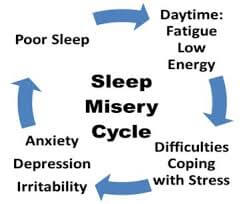
With poor mood, concentration, and low energy levels, stress levels quickly add up. And as we discussed before, this is bad news for our relationships, ability to earn a living, and mental/physical health.
What we know:
- heightened levels of stress reduce the body’s production of melatonin, the hormone that is most commonly associated with the sleep-wake cycle.
- that prolonged stress increases the output of the stress hormone norepinephrine, which is known to decrease deep sleep, or REM (Rapid Eye Movement), which has a massive effect on the sleep-wake cycle.
- stress increases the body’s output of cortisol, the primary stress hormone. Increased cortisol can be a good thing but it can also disrupt your sleep and make you very anxious, which is a horrible combination.
- There is also some evidence to suggest a lack of sleep can increase your risk to certain cancers. In particular, people whose body clock is disrupted because of shift work (this includes young mothers who are up at random times) are at increased risk.
- In women with poor sleep, the breast cancer risk was found in the linked study to be 30% higher than with women who did not suffer from poor sleep. In men, the prostate cancer risk was also found to be higher.
The bottom line is proper sleep is crucial for our health and well-being. Our physical and mental health depends on it. Stress throws a spanner into the works, and if left untreated it can become very troublesome indeed. Sleeping problems can develop into insomnia, and a lack of sleep can lead to anxiety and depression.
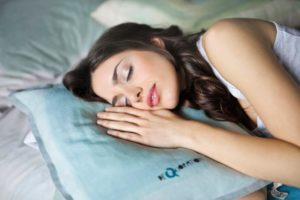
Top sleeping aids to help you sleep better in 2019
Here are some of the best and safest sleeping aids to help you sleep better:
1. Weighted blankets
Weighted blankets have become very popular. Studies have shown they can reduce the symptoms of insomnia, reduce stress, and reduce anxiety.
They have also been shown to help with sleeping disorders linked to ADHD and autism, as well as Tourette syndrome and more conditions.
Weighted blankets weigh 8-13% of your body weight and enable a therapy called Deep Pressure Stimulation. Hospitals use this therapy to treat anxiety with squeeze machines and weighted blankets work in the same way at home.
Wearing (and sleeping with) a weighted blanket replicates the sensation of being cuddled. This triggers a hormonal response which calms the body and mind, helping to reduce stress and improve sleep quality and duration.
2. Soothing Sounds and Music

Soothing sounds and music can improve your sleep by switching your mind to calmer thoughts. The Sleep Foundation says adults who listen to 45 minutes of relaxing music before bed fall asleep faster and sleep longer. If music and sounds are not your thing, a good alternative is an audiobook read by someone with a soft voice.
3. Memory Foam Pillows
If you find yourself tossing and turning in the night, it’s probably because you’re uncomfortable. It could be your mattress, or your body playing tricks on you, but it’s more likely to be your pillow denying you a proper sleep.
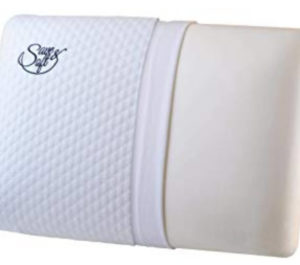
A pillow that doesn’t support your neck and head properly will make you very uncomfortable. A firm pillow is always best, and memory foam is the way forward because it won’t compress in the same way as feathers.
If you sleep with two pillows, put the firm memory foam pillow under your softer pillow and see how it goes. It could well be a revelation.
4. Ear Plugs
By far the simplest sleeping aid recommendation here, ear plugs can help drown out background noise and disturbances. If you live on a noisy street or have noisy neighbours, these little bundles of foam can work wonders. You can get a bag of disposable ones for a tenner or so online. Definitely worth a try.
5. Melatonin Capsules
Melatonin is considered safe to take orally for short-term use, and it has proven quite successful in improving sleep quality.
The National Sleep Foundation recommends an adult dosage of between two tenths of a milligram and five milligrams 60 minutes before bedtime.
As with all medicinal treatments, you should consult a doctor before trying it. If you do, make sure you purchase 100% melatonin from a reputable source (preferably one in your own country) and ALWAYS read the reviews and label.

